模块2 Unit 2 Wish you were here Grammar and usage(1)_ Future continuous tense课件(25张)
文档属性
| 名称 | 模块2 Unit 2 Wish you were here Grammar and usage(1)_ Future continuous tense课件(25张) |  | |
| 格式 | zip | ||
| 文件大小 | 408.0KB | ||
| 资源类型 | 教案 | ||
| 版本资源 | 牛津译林版 | ||
| 科目 | 英语 | ||
| 更新时间 | 2019-07-22 21:46:23 | ||
图片预览

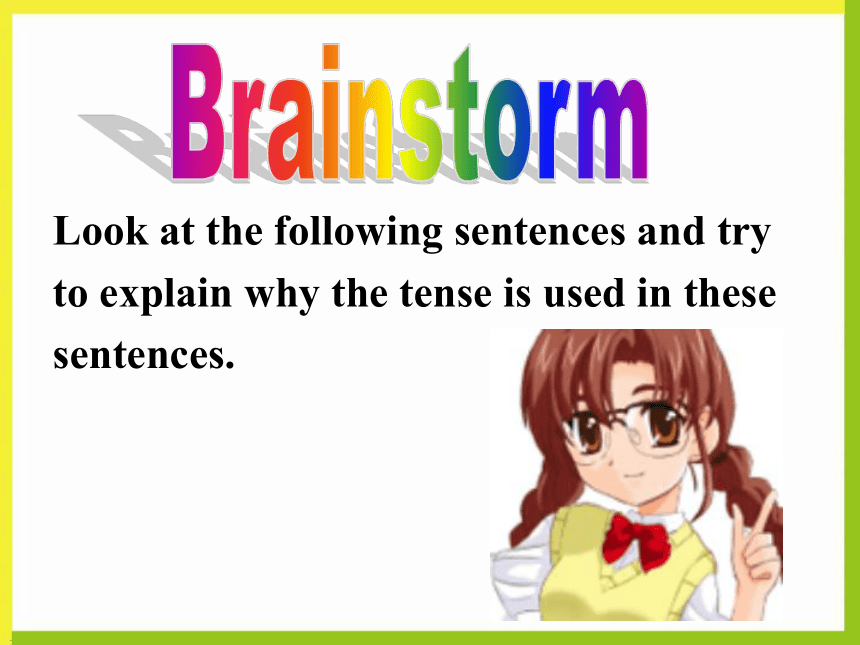

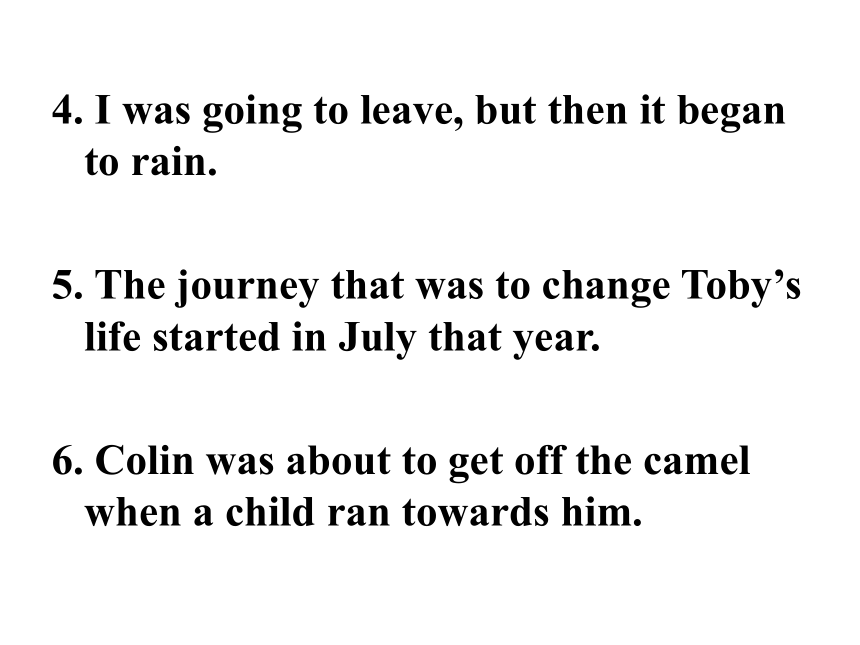
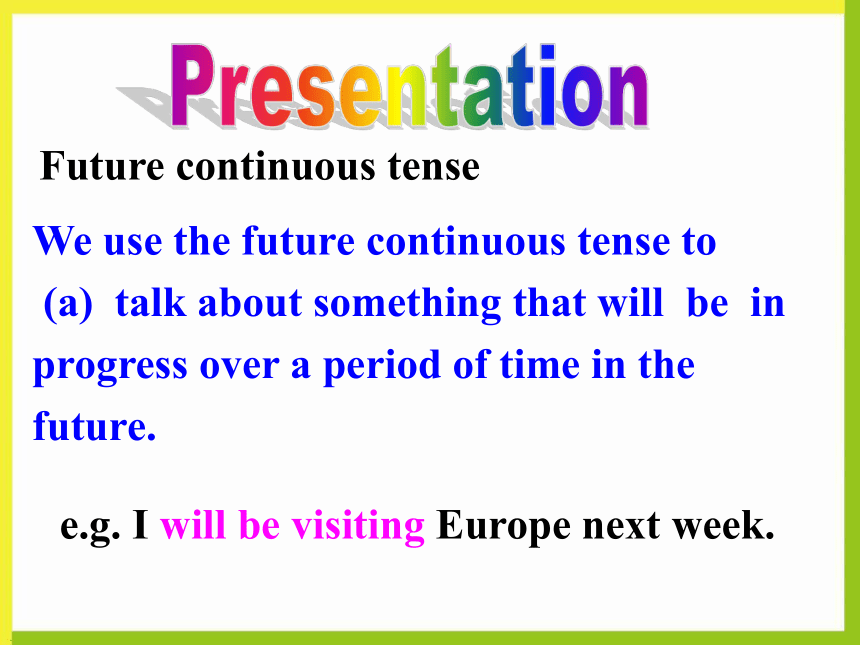
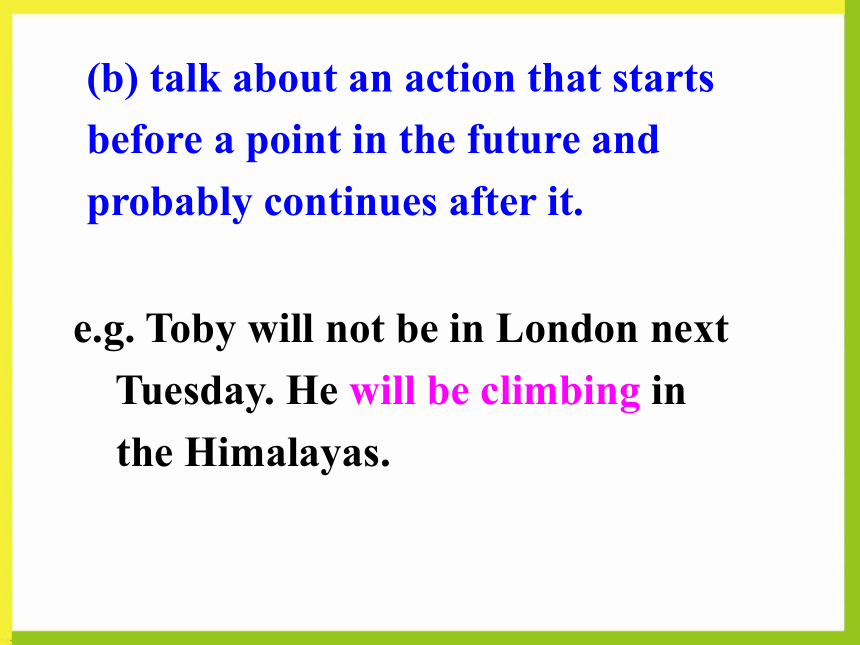
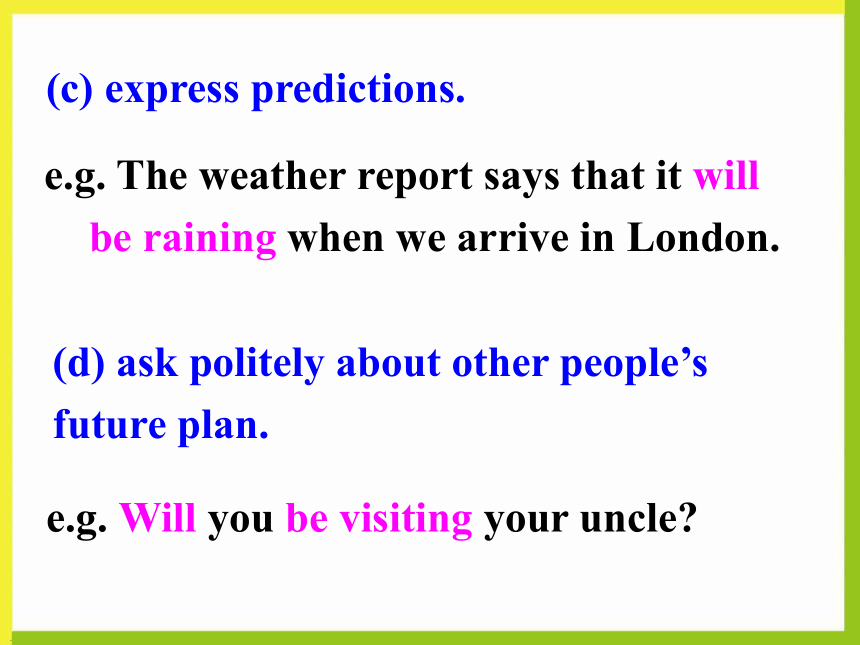

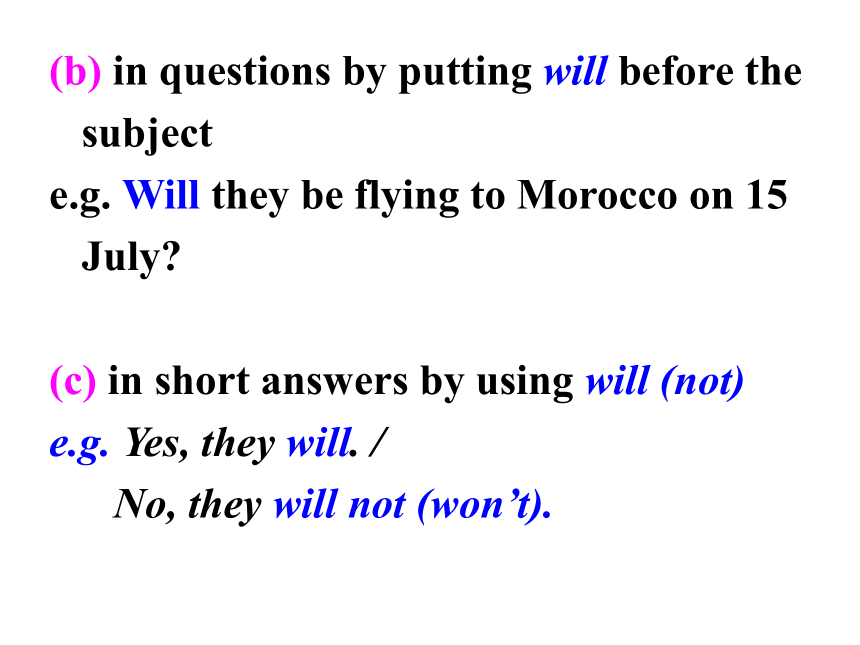
文档简介
课件25张PPT。Future Continuous Tense
& Future in the pastGrammar and usage Unit 2
Look at the following sentences and try
to explain why the tense is used in these
sentences.BrainstormToby will be climbing in the Himalayas next week.
2. The weather report says that it will be raining when we arrive in London.
3. They set off at 9:00a.m. and would reach the airport an hour later.4. I was going to leave, but then it began to rain.
5. The journey that was to change Toby’s life started in July that year.
6. Colin was about to get off the camel when a child ran towards him.Future continuous tensee.g. I will be visiting Europe next week.We use the future continuous tense to
(a) talk about something that will be in progress over a period of time in the future.Presentation(b) talk about an action that starts before a point in the future and probably continues after it.e.g. Toby will not be in London next
Tuesday. He will be climbing in
the Himalayas.e.g. The weather report says that it will
be raining when we arrive in London.(c) express predictions.(d) ask politely about other people’s future plan.e.g. Will you be visiting your uncle?(a) in statements by using will (not) be + V-ing
e.g. Toby and his brother, Colin, will (not) be flying to Morocco.
The form of the future
continuous tense:(b) in questions by putting will before the subject
e.g. Will they be flying to Morocco on 15 July?
(c) in short answers by using will (not)
e.g. Yes, they will. /
No, they will not (won’t). Practice: Read the note and complete the reply.1._____________________
2. ____________________
3._____________________
4. ____________________
5._____________________will be travellingwill be interviewingwill be goingwill writewill be exploringFuture in the pastWe use the future in the past to
(a) report an action in the past from a time when it was still in the future.
e.g. They set off at 9:00a.m. and would reach the airport an hour later.(b) indicate a past intention.
e.g. I was going to leave, but then it
began to rain. (c) indicate a past arrangement.
e.g. Colin left work early because he
was going to see Jennifer later that
afternoon.(d) mean that the future action actually
happened.
e.g. The journey that was to change
Toby’s life started in July that year.The form of the future in the past:(a) would + the base form of a verb
e.g. Colin and I would spend a few weeks travelling after he graduated.
(b) was/were going to
e.g. We were going to see the wild animals, but then we didn’t have time.
(c) was/were to
e.g. It was his last day at school— he
was to leave the next morning.(d) was/were about to
e.g. Colin was about to get off the
camel when a child ran towards him. 1.___________________
2. ___________________
3.________________ 4. ________________
5.________________ 6. ________________
7.________________ 8. ________________were going to watchwere about to turn offwould lastwouldn’t seewould get upwould stopwould fall downwould never forgetPractice: Ask the students to finish Part A and Part B on Page 30&31 Translate the following sentences. 1. 今下午三点到四点,我们要开会。 2. 我想他马上就会到的。PracticeWe will be having a meeting from
3 to 4 this afternoon.I think he’ll be coming soon.4. 史密斯夫妇下个星期去巴西。随后这
个月他们将在墨西哥旅行。Mr. and Mrs. Smith are going to Brazil next week, and they will be travelling in Mexico later in the month.3. 我不知道我们什么时候再在一起工作。
I don’t know when we will be working together again.Multiple choice:1. Send for a doctor quickly, or the old man ______. A. will die B. is dying
C. dies D. died2. Henry will not be able to attend the meeting tonight because ____. A. he must teach a class B. he will be teaching a class C. he teaches a class D. he will have been teaching3. We ___ a basketball match at five tomorrow afternoon.
A. watch
B. will have watched
C. can watch
D. will be watching4. If he ___, don’t interrupt him. A. still works B. will still be working C. still has been working D. is still working5. If the horse wins tomorrow, he ___ twenty races in the past three years. A. will win B. would win
C. will have won D. has won1. Finish Part C1 and C2 on page 96 in
Workbook.
2. Review Future Continuous Tense and Future in the past. Homework
Look at the following sentences and try
to explain why the tense is used in these
sentences.BrainstormToby will be climbing in the Himalayas next week.
2. The weather report says that it will be raining when we arrive in London.
3. They set off at 9:00a.m. and would reach the airport an hour later.4. I was going to leave, but then it began to rain.
5. The journey that was to change Toby’s life started in July that year.
6. Colin was about to get off the camel when a child ran towards him.Future continuous tensee.g. I will be visiting Europe next week.We use the future continuous tense to
(a) talk about something that will be in progress over a period of time in the future.Presentation(b) talk about an action that starts before a point in the future and probably continues after it.e.g. Toby will not be in London next
Tuesday. He will be climbing in
the Himalayas.e.g. The weather report says that it will
be raining when we arrive in London.(c) express predictions.(d) ask politely about other people’s future plan.e.g. Will you be visiting your uncle?(a) in statements by using will (not) be + V-ing
e.g. Toby and his brother, Colin, will (not) be flying to Morocco.
The form of the future
continuous tense:(b) in questions by putting will before the subject
e.g. Will they be flying to Morocco on 15 July?
(c) in short answers by using will (not)
e.g. Yes, they will. /
No, they will not (won’t). Practice: Read the note and complete the reply.1._____________________
2. ____________________
3._____________________
4. ____________________
5._____________________will be travellingwill be interviewingwill be goingwill writewill be exploringFuture in the pastWe use the future in the past to
(a) report an action in the past from a time when it was still in the future.
e.g. They set off at 9:00a.m. and would reach the airport an hour later.(b) indicate a past intention.
e.g. I was going to leave, but then it
began to rain. (c) indicate a past arrangement.
e.g. Colin left work early because he
was going to see Jennifer later that
afternoon.(d) mean that the future action actually
happened.
e.g. The journey that was to change
Toby’s life started in July that year.The form of the future in the past:(a) would + the base form of a verb
e.g. Colin and I would spend a few weeks travelling after he graduated.
(b) was/were going to
e.g. We were going to see the wild animals, but then we didn’t have time.
(c) was/were to
e.g. It was his last day at school— he
was to leave the next morning.(d) was/were about to
e.g. Colin was about to get off the
camel when a child ran towards him. 1.___________________
2. ___________________
3.________________ 4. ________________
5.________________ 6. ________________
7.________________ 8. ________________were going to watchwere about to turn offwould lastwouldn’t seewould get upwould stopwould fall downwould never forgetPractice: Ask the students to finish Part A and Part B on Page 30&31 Translate the following sentences. 1. 今下午三点到四点,我们要开会。 2. 我想他马上就会到的。PracticeWe will be having a meeting from
3 to 4 this afternoon.I think he’ll be coming soon.4. 史密斯夫妇下个星期去巴西。随后这
个月他们将在墨西哥旅行。Mr. and Mrs. Smith are going to Brazil next week, and they will be travelling in Mexico later in the month.3. 我不知道我们什么时候再在一起工作。
I don’t know when we will be working together again.Multiple choice:1. Send for a doctor quickly, or the old man ______. A. will die B. is dying
C. dies D. died2. Henry will not be able to attend the meeting tonight because ____. A. he must teach a class B. he will be teaching a class C. he teaches a class D. he will have been teaching3. We ___ a basketball match at five tomorrow afternoon.
A. watch
B. will have watched
C. can watch
D. will be watching4. If he ___, don’t interrupt him. A. still works B. will still be working C. still has been working D. is still working5. If the horse wins tomorrow, he ___ twenty races in the past three years. A. will win B. would win
C. will have won D. has won1. Finish Part C1 and C2 on page 96 in
Workbook.
2. Review Future Continuous Tense and Future in the past. Homework
